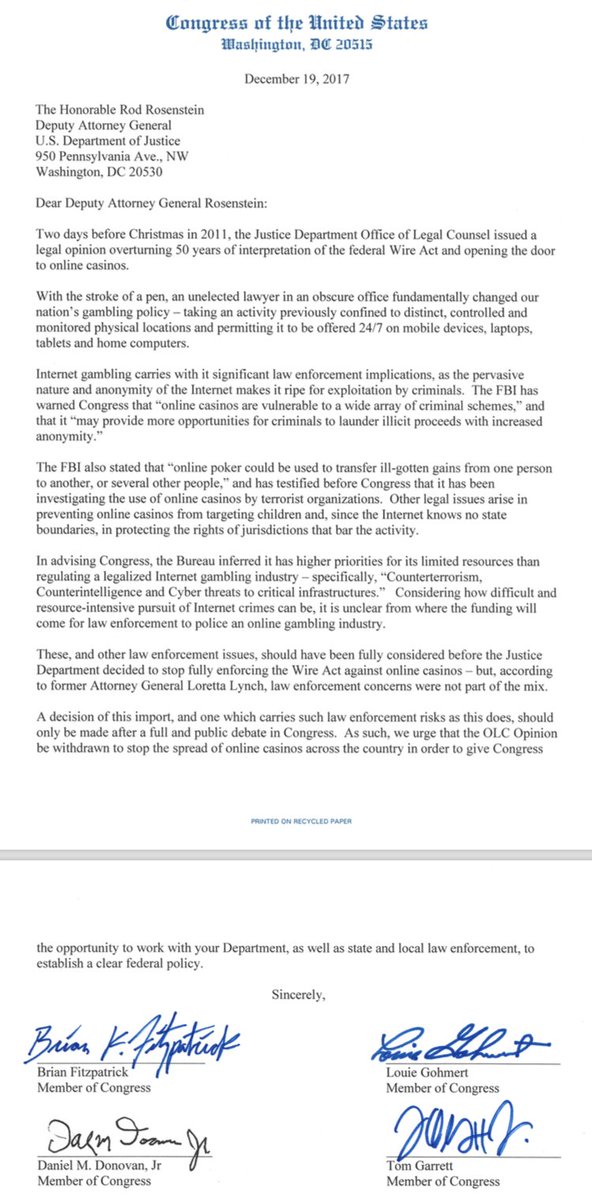Another RAWA Plea Sent to US Department of Justice
It happened again. Several members of Congress collectively penned a letter to the US Department of Justice to ask that the 2011 Wire Act decision be overturned. This move would effectively prohibit states from offering online poker and casino games while giving Congress a chance to ban online gaming.
This action was just discovered by the Poker Players Alliance but happened on December 19. And if it sounds familiar, it is due to a very similar letter was sent on November 21 by different members of Congress. While US legislators are tasked with handling major issues like taxes, infrastructure, health care, immigration, and the national budget, some have chosen to take a stand on states’ rights to legalize internet gambling.
Latest Letter to Rosenstein
The letter sent to US Deputy Attorney General Rod Rosenstein was dated December 19, 2017. It was signed by US Representatives Dan Donovan of New York, Tom Garrett of Virginia, Brian Fitzpatrick of Pennsylvania, and Louie Gohmert of Texas, all Republicans.

It began by reminding Rosenstein of the 2011 DOJ decision regarding the Wire Act that was issued six years prior to the writing of the current letter.
“With the stroke of a pen, an unelected lawyer in an obscure office fundamentally changed our nation’s gambling policy – taking an activity previously confined to distinct, controlled, and monitored physical locations and permitting it to be offered 24/7 on mobile devices, laptops, tablets, and home computers.”
The false points about online gambling then began.
“Internet gambling carries with it significant law enforcement implications, as the pervasive nature and anonymity of the internet makes it ripe for exploitation by criminals. … Other legal issues arise in preventing online casinos from targeting children and, since the internet knows no state boundaries, in protecting the rights of jurisdictions that bar the activity.”
The letter contains numerous outdated and/or utterly false statements, and the Congressmen attack former US Attorney General Loretta Lynch for not including law enforcement concerns in her approval of the Wire Act decision. The decision, in fact, was made by US Deputy Attorney General James Cole under the leadership of US Attorney General Eric Holder.
Finally, the letter pleads for a reversal of the decision so Congress will be able to debate the issue and make a law regarding the legality of online poker and casino games. Most Republicans tout states’ rights as a core issue of importance to their party and constituents, but this request intends to take away that right and put it in the hands of the federal government.
“A decision of this import, and one which carries such law enforcement risks as this does, should only be made after a full and public debate in Congress. As such, we urge the OLC Opinion be withdrawn to stop the spread of online casinos across the country in order to give Congress the opportunity to work with your department, as well as state and local law enforcement, to establish a clear federal policy.”
Not the First Rodeo for RAWA Request
This and past requests of the US Department of Justice have the same goal as bills like the Restoration of America’s Wire Act that have been put to Congress. They have failed to gain traction because most Republicans tend to favor states’ rights, especially on an issue that is online gambling. But casino mogul Sheldon Adelson has been pushing members of Congress – whether through personal pleas or campaign donations that garner influence – to help him obtain a full ban on internet gambling.
However, this letter is very similar to one sent less than a month prior. That one on November 21 was penned by the bipartisan duo of US Senators Lindsey Graham and Dianne Feinstein. Their letter focused more on the proliferation of online gambling as evidenced by Pennsylvania recently legalizing it to become the fourth state to do so.
Both letters contained misleading references to outdated FBI statements on the topic of internet gambling, all of which have since been disproven by technological advancements used successfully by Nevada, Delaware, and New Jersey in the past several years. Those online gambling endeavors have proven more effective in preventing underage gambling than methodologies used by brick-and-mortar casinos, especially those operated by Adelson himself.
Efforts to Ban Online Gambling Increase
The letters sent to Rosenstein in the past two months indicate that Adelson is likely increasing pressure on legislators to take action. Pennsylvania’s move last year to legalize online gambling, in addition to other states like New York and Michigan coming very close to doing the same, are also indicating to legislators that there is an urgency to the matter. The more states that legalize online poker and gambling, the tougher a Wire Act reversal or RAWA law will be to implement, especially with states poising to take their rights to court.
It is also possible that anti-online gambling legislators see Rosenstein as an ally in their efforts, and his tenure at the DOJ could be limited if President Donald Trump decides to fire him. With US Attorney General Jeff Sessions already recused in the matter due to his close affiliations with Adelson, Rosenstein is their best bet to reverse the 2011 decision.
https://www.legaluspokersites.com/news/9903-2/9903